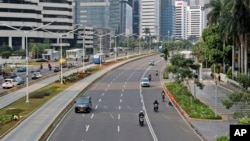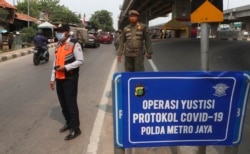Main streets were less crowded Monday as Jakarta began two weeks of social restrictions to slow a rise of coronavirus cases. The rising number has pushed critical-care hospital services in Indonesia’s capital to unsafe levels.
Police officers took steps to punish bicycle riders who did not wear face masks in public. But businesses did not seem to know what to do under the new restrictions. And workers said supporting the healthcare system should be the top goal.
The Governor of Jakarta, Anies Baswedan, announced Sunday that the restrictions were to last from Monday until September 27. He said the move was part of an emergency decision to control a rapid expansion in coronavirus cases in the city.
Under the order, social, economic, religious, cultural, and school activities are to be restricted. The order identifies food services, banking and nine other industries as essential. They are permitted to operate, but under special health safety measures and with half the usual number of workers.
Schools, public recreation areas and wedding party venues must stay closed until the restrictions are lifted. Restaurants and eateries are limited to takeaway and delivery service. Shopping centers must limit the number of visitors and their hours. Only religious centers in residential areas are permitted to open.
Jakarta’s government had ordered large-scale social restrictions from April to June, then slowly eased the restrictions with businesses reopening and obeying health safety protocols.
But the virus has spread to many areas since June, and medical centers are filling with sick patients. Seven of 67 COVID-19 referral hospitals in Jakarta are 100 percent occupied, while 46 are more than 60 percent full.
Indonesia’s coronavirus task force reports that more than 54,000 of the nation’s 218,000 cases of COVID-19 are in Jakarta. The nation has over 8,800 deaths from the disease. About 15 percent of those patients lived in Jakarta.
A task force spokesperson said Jakarta has had the most COVID infections nationwide over the past five weeks.
“We should do these restrictions earlier, so we can control the positive case numbers and the death rate,” the spokesperson said.
While residents are hoping the restrictions reduce the spread of the virus, they are worrying about the effect on businesses.
Sumaidi operates a printing business and photography studio in Jakarta. He told The Associated Press that the city needs the social restrictions. But he was not sure whether to open his business or totally close it.
“We can see how effective it is so far, we need more self-awareness too. But the economic activities cannot be stuck,” Sumaidi said.
Sigit Ardianto works for a public company in Jakarta. He said that in addition to the new restrictions and punishing those who violate them, the government should fix medical services. He appealed for more rooms and better service at hospitals, “since the reason we have high case numbers is because of our health facility issues.”
I’m Jonathan Evans.
Edna Tarigan reported on this story for the Associated Press. George Grow adapted it for VOA Learning English. Mario Ritter, Jr. was the editor.
____________________________________________________________
Words in This Story
critical –adj. very serious, involving great danger
bicycle – n. a vehicle powered by two wheels, one behind the other
essential - adj. necessary or important
venue – n. the place where something happens
delivery – n. the action of transporting goods or other objects
shopping - adj. related to the activity of buying goods from stores
residential – adj. occupied by or relating to private homes
referral – n. the action of directing a patient to a medical specialist
studio – n. the workplace of a painter or photographer
awareness – n. knowledge of a fact or situation
We want to hear from you. Write to us in the Comments Section.






